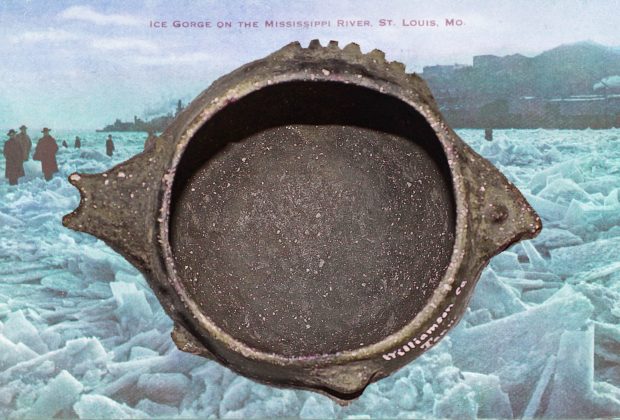Presentation by David Lobbig, Curator of Environmental Life at the Missouri History Museum
Wednesday, November 6, 2019
Big A’s on the Riverfront View on map
6:00 p.m. Social Hour, 7:00 p.m. Presentation
David Lobbig will use stories and artifacts collected for the upcoming “The Mighty Mississippi” exhibit at the Missouri History Museum to explore changes affecting the Missouri and Mississippi confluence region since European and United States’ colonization.
This Mississippian era bowl depicting a sturgeon covers a postcard showing the frozen Mississippi River in the St. Louis area. Two artifacts featured in “The Mighty Mississippi” exhibit opening at the Missouri History Museum in St. Louis.
NOTE – This month’s presentation is the FIRST WEDNESDAY of the month (not the second Wednesday as usual). There will be no presentation in December.
Presentation is FREE and open to the public!
Hosted by Greenway Network
The Missouri History Museum in St. Louis Forest Park will be opening a longterm exhibit beginning Nov. 21 called “The Mighty Mississippi”, exploring the impact of the Mississippi River on the town that is perched at the confluence of our nation’s two greatest rivers, and the impact of this urban area on the rivers that embrace it.
David Lobbig, the Missouri Historical Society’s Curator of Environmental Life, will build on artifacts and maps seen in “The Mighty Mississippi” to discuss changes affecting the Missouri and Mississippi confluence region since European and United States’ colonization. He’ll explore biodiversity loss and the prospects for greater change caused by human population dominance and the climate crisis.
The Mighty Mississippi exhibit will be broken up into 4 sections: Lifeblood of the Heartland(explores water quality issues, biodiversity, human manipulation of river and floodplain), First Peoples World (explores prehistoric American Indian/Mississippian culture featuring real artifacts from the time period), Empires (explores colonialism and the fur trade), and Industry(explores the industrial era and the rise and fall of the steamboat era.
Our Presenter – David Lobbig, Curator of Environmental Life – Missouri History Museum – David’s work focuses on environmental history and natural resource use. The interaction between resource exploitation and the biotic community inform his mission to engage the public with a greater understanding of sustainability. Through exhibitions and artifacts, his work shares how historic and present-day decisions relate to dynamic environmental change.

